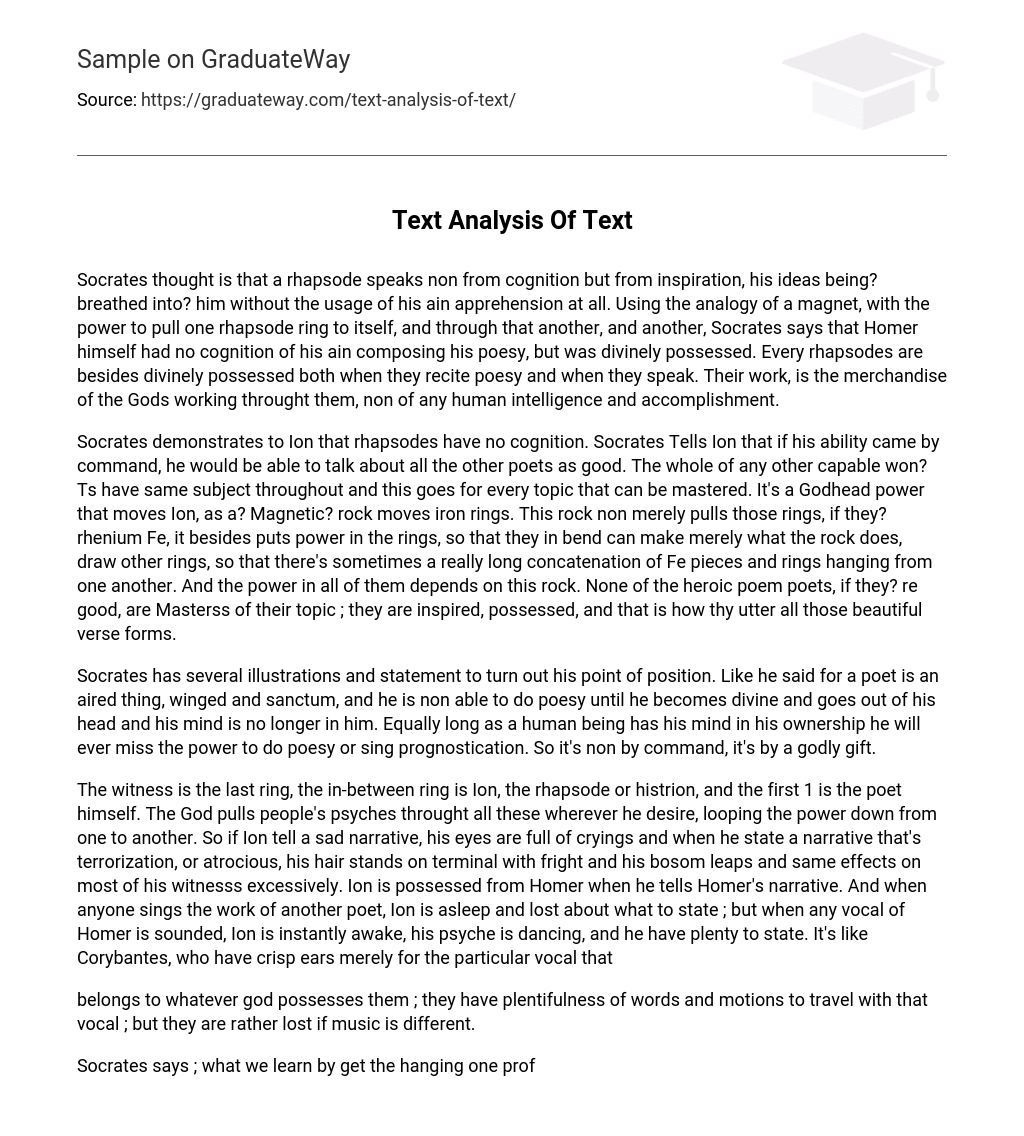Socrates thought is that a rhapsode speaks non from cognition but from inspiration, his ideas being? breathed into? him without the usage of his ain apprehension at all. Using the analogy of a magnet, with the power to pull one rhapsode ring to itself, and through that another, and another, Socrates says that Homer himself had no cognition of his ain composing his poesy, but was divinely possessed. Every rhapsodes are besides divinely possessed both when they recite poesy and when they speak. Their work, is the merchandise of the Gods working throught them, non of any human intelligence and accomplishment.
Socrates demonstrates to Ion that rhapsodes have no cognition. Socrates Tells Ion that if his ability came by command, he would be able to talk about all the other poets as good. The whole of any other capable won? Ts have same subject throughout and this goes for every topic that can be mastered. It’s a Godhead power that moves Ion, as a? Magnetic? rock moves iron rings. This rock non merely pulls those rings, if they? rhenium Fe, it besides puts power in the rings, so that they in bend can make merely what the rock does, draw other rings, so that there’s sometimes a really long concatenation of Fe pieces and rings hanging from one another. And the power in all of them depends on this rock. None of the heroic poem poets, if they? re good, are Masterss of their topic ; they are inspired, possessed, and that is how thy utter all those beautiful verse forms.
Socrates has several illustrations and statement to turn out his point of position. Like he said for a poet is an aired thing, winged and sanctum, and he is non able to do poesy until he becomes divine and goes out of his head and his mind is no longer in him. Equally long as a human being has his mind in his ownership he will ever miss the power to do poesy or sing prognostication. So it’s non by command, it’s by a godly gift.
The witness is the last ring, the in-between ring is Ion, the rhapsode or histrion, and the first 1 is the poet himself. The God pulls people’s psyches throught all these wherever he desire, looping the power down from one to another. So if Ion tell a sad narrative, his eyes are full of cryings and when he state a narrative that’s terrorization, or atrocious, his hair stands on terminal with fright and his bosom leaps and same effects on most of his witnesss excessively. Ion is possessed from Homer when he tells Homer’s narrative. And when anyone sings the work of another poet, Ion is asleep and lost about what to state ; but when any vocal of Homer is sounded, Ion is instantly awake, his psyche is dancing, and he have plenty to state. It’s like Corybantes, who have crisp ears merely for the particular vocal that
belongs to whatever god possesses them ; they have plentifulness of words and motions to travel with that vocal ; but they are rather lost if music is different.
Socrates says ; what we learn by get the hanging one proferrion we won? T learn by get the hanging another. Knowledge [ involved in one instance ] trades with different topics from the cognition [ in another instance ] , so that one is a different profession from the other. A individual who has non mastered a given profession will non be a good justice of the things, which belong to that profession, whether they are things said or things done. For illustration, rhapsode’s profession is different from the charioteer? s, so its cognition is of different subjects.So a rhapsode’s profession, on your position, will non cognize everything, and neither will a rhapsode.therefore, a rhapsode it’s as person Godhead, and non as maestro of a profession, Ion is merely a vocalist of Homer’s congratulationss.
Ion as rhapsode, a reciter of Homer, and despite his endowment for dramatics, modulation, and voice inflexion the apparently necessary vocal tools of a recite his cognition and apprehension of Homer, specifically in footings of those assorted humanistic disciplines, fails to widen beyond his ability to memorise the heroic poem verse form. This becomes of import when one considers the function of such rhapsodes in Greece, as translators of Homer, and in that capacity, as, basically redacts of the text. The danger apparent here, Socrates asserts, is in that the reading of Homer, conducted by a rhapsode, is a merchandise wholly of ignorance.
I believe there are jobs built-in in this state of affairs emerging out of an audience read-only memory bad. Further, if one choosesinability to acknowledge differentiations between readings based on content and on dramatics in order to foster create that dynamic where a pick is made in order to acknowledge good, one must distinguish good degree Fahrenheit good based upon false information or an sick presentation of that moral force needed for pick, good may be bad, or good may the lone option available. The danger, of class, lies within that state of affairs where the false reading of a narrative is witnessed as antic by an audience, and recorded as such. Socrates frights this province of pattern. He, as does Homer, works within the kingdom of the spoken word, and while dramatics and adornment may tag the popularity of the rhapsode, neither is any indicant of a correct, or even valid, reading of any art expressed in Homer verse forms, peculiarly that art of stating a narrative, where the relation becomes at one time a theatrical presentation, and an reading.
Bibliography
Text Analysis of Text # 1: PLATP, ION





